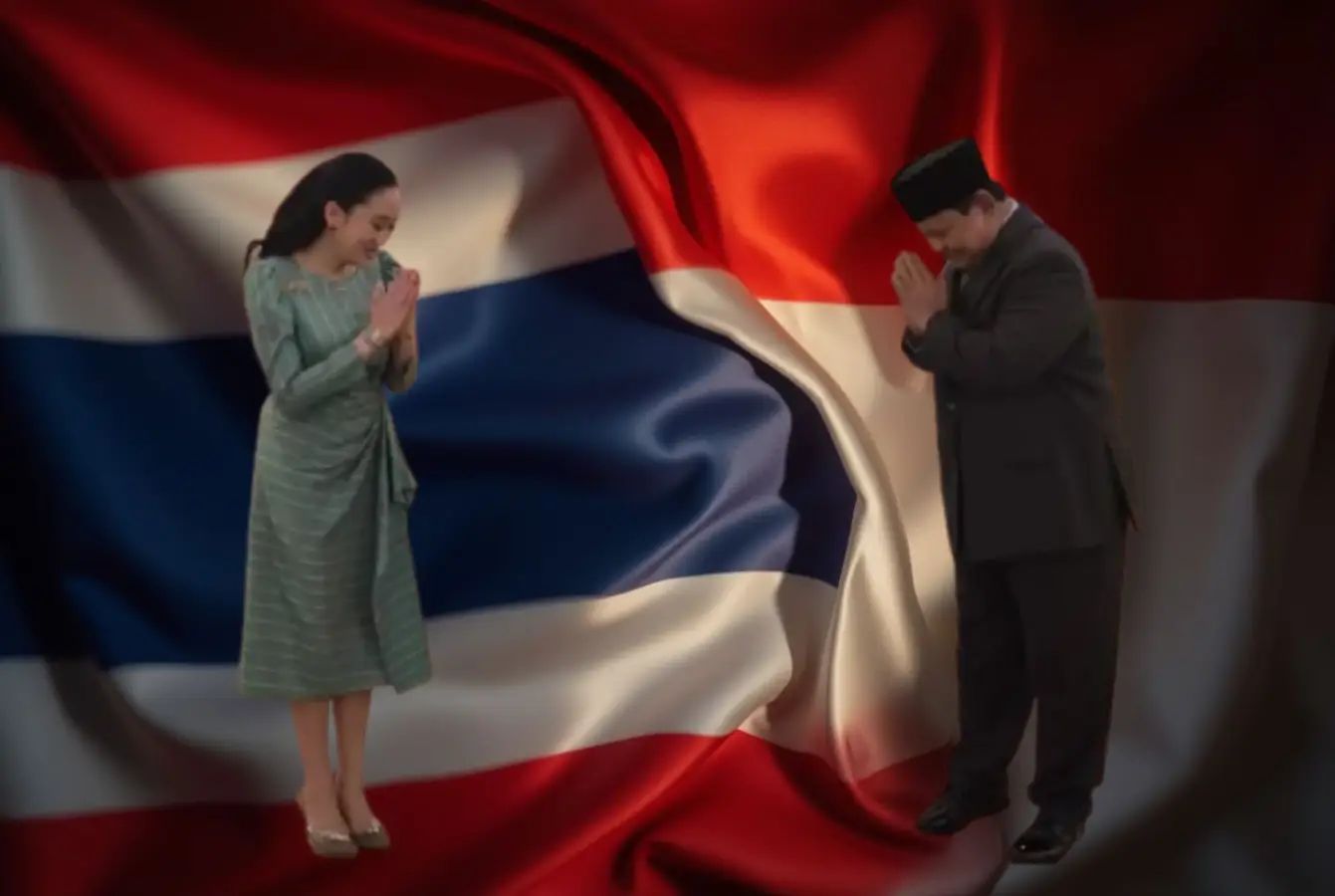Thai Prime Minister Paetongtarn Shinawatra and Indonesian President Prabowo Subianto have elevated bilateral ties to a strategic partnership, marking a significant milestone in the 75th anniversary of diplomatic relations between the two nations. The announcement came during a high-level summit at Government House in Bangkok on May 20, 2025, where the leaders also witnessed the signing of a Memorandum of Understanding (MoU) on health cooperation, setting the stage for deeper collaboration across multiple sectors.
Health Cooperation as a Foundation
The centerpiece of the summit was the MoU signed between Thailand’s Ministry of Public Health and Indonesia’s Ministry of Health, represented by Thailand’s Public Health Minister Somsak Thepsuthin and Indonesia’s Foreign Minister Sugiono. The agreement focuses on strengthening health systems, enhancing primary healthcare services, and combating communicable diseases. It also prioritizes the security of pharmaceuticals and medical supplies, alongside initiatives in health financing and health tourism.
This health collaboration is seen as a timely response to regional challenges, particularly in the wake of global health crises that have exposed vulnerabilities in Southeast Asian healthcare systems. By pooling resources and expertise, both nations aim to build more resilient frameworks, a move that could serve as a model for ASEAN-wide cooperation. Thailand, with its experience in universal health coverage since 2001, expressed readiness to share insights with Indonesia, further cementing its role as a regional leader in public health policy.
A Strategic Partnership for the Future
The elevation of Thailand-Indonesia relations to a strategic partnership underscores a mutual commitment to deepen ties across political, economic, and security domains. Prime Minister Paetongtarn, in her remarks during the joint press conference, emphasized the historical friendship between the two countries, tracing it back over 150 years to King Chulalongkorn’s visit to Java in 1871. She described President Subianto’s visit—his first official trip to Thailand—as a reaffirmation of this enduring bond.
The leaders co-chaired the inaugural leaders’ consultation, a new mechanism designed to ensure regular high-level exchanges. This framework, alongside a strategic partnership action plan to be finalized by the foreign ministries within the year, signals an intent to institutionalize cooperation. Such steps are critical in a region navigating complex geopolitical tensions and economic uncertainties, where bilateral alliances can bolster stability within the ASEAN bloc.
Economic Ties and Tourism Boost
Economic collaboration emerged as a key pillar of the discussions, with both leaders committing to expand trade, investment, and tourism. Bilateral trade in 2024 reached US$18 billion (594.88 billion Thai Baht, ~US$16.5 billion based on current exchange rates), and Prime Minister Paetongtarn expressed optimism about untapped potential. Thailand will host the first Joint Trade Committee meeting later this year to explore new avenues for cooperation, encouraging closer ties between public agencies and private sectors.
Tourism, a vital sector for both economies, received a significant push with the launch of new flight routes connecting Bangkok to Surabaya and Medan, alongside a planned Phuket-Medan route. These connections are expected to enhance links between Thailand and Indonesia’s eastern Java and northern Sumatra regions, driving tourist inflows. Joint promotional efforts by tourism agencies aim to maximize the impact of these routes, potentially unlocking new cultural and economic exchanges.
Food security and energy were also on the agenda, with agreements to revitalize agricultural trade, particularly in the halal industry, and explore sustainable fisheries. Energy security discussions focused on renewable and green energy partnerships, aligning with global pushes for sustainability. These initiatives reflect a shared recognition of the need to address long-term challenges like climate change and resource scarcity, which disproportionately affect Southeast Asia.
Security and Regional Stability
On the security front, Thailand and Indonesia pledged to enhance military cooperation, including potential joint efforts in defense industry collaboration. Police forces from both nations will also intensify efforts to combat transnational crimes such as online fraud, human trafficking, and drug smuggling—issues that have surged in the region due to digital connectivity and porous borders. These commitments highlight a pragmatic approach to shared challenges, prioritizing actionable outcomes over symbolic gestures.
Both leaders reaffirmed their dedication to ASEAN centrality and unity, a principle that remains crucial amid global geopolitical shifts. They expressed a joint commitment to inclusive and sustainable economic and social integration within the region, alongside efforts to maintain stability. A particular focus was placed on Myanmar, where ongoing conflict and political instability continue to pose challenges for ASEAN. As close neighbors to Myanmar, Thailand and Indonesia vowed to work with Malaysia, the current ASEAN chair, to support peace initiatives, emphasizing the bloc’s leading role in fostering dialogue.
Historical Context and Personal Diplomacy
The personal rapport between Prime Minister Paetongtarn and President Subianto was evident throughout the summit, with the Thai leader expressing gratitude for Indonesia’s warm friendship. She highlighted the significance of the 75th anniversary of diplomatic relations, a milestone that adds symbolic weight to the strategic partnership. Paetongtarn also extended her thanks for Indonesia’s support of Thai businesses operating in the country, requesting continued fair treatment to ensure their smooth operations—a nod to the practical concerns underpinning high-level diplomacy.
President Subianto’s visit, reciprocated by Paetongtarn’s expressed hope for a future trip to Indonesia, underscores the importance of personal diplomacy in strengthening ties. Such exchanges, rooted in mutual respect and shared history, often pave the way for more substantive agreements, as trust at the leadership level trickles down to bureaucratic and public spheres.
Broader Implications for ASEAN
The outcomes of this summit extend beyond bilateral relations, offering a blueprint for ASEAN cooperation at a time when the region faces multifaceted challenges. From economic uncertainties driven by global supply chain disruptions to security threats posed by transnational crime, the Thailand-Indonesia partnership demonstrates how targeted collaboration can address shared concerns. Their focus on health, trade, and regional stability aligns with ASEAN’s broader goals of integration and resilience, potentially inspiring other member states to pursue similar strategic alignments.
Analysts suggest that the strategic partnership could serve as a counterbalance to external influences in Southeast Asia, particularly as major powers like the United States and China vie for regional influence. By prioritizing intra-ASEAN cooperation, Thailand and Indonesia send a message of self-reliance and collective strength, reinforcing the bloc’s relevance on the global stage. However, the success of this partnership will depend on the implementation of agreed-upon mechanisms, such as the strategic action plan and Joint Trade Committee outcomes, which will require sustained political will and bureaucratic coordination.
Public Sentiment and Future Prospects
Public reaction to the summit has been largely positive, with many in Thailand and Indonesia viewing the strengthened ties as a step toward mutual prosperity. Social media sentiment, particularly among Thai and Indonesian users, reflects optimism about increased tourism and economic opportunities, though some express cautious hope that promises of cooperation translate into tangible benefits for ordinary citizens. The focus on health and food security, in particular, resonates with communities still grappling with the aftereffects of pandemics and rising living costs.
As Thailand and Indonesia move forward with their strategic partnership, questions remain about how these commitments will unfold amid domestic and regional pressures. Will the new mechanisms for dialogue and cooperation withstand political changes or economic downturns? And how will their joint stance on Myanmar influence ASEAN’s broader approach to the crisis? For now, the Bangkok summit stands as a testament to the power of dialogue and shared vision, offering a hopeful glimpse of what Southeast Asian collaboration can achieve in an uncertain world.















